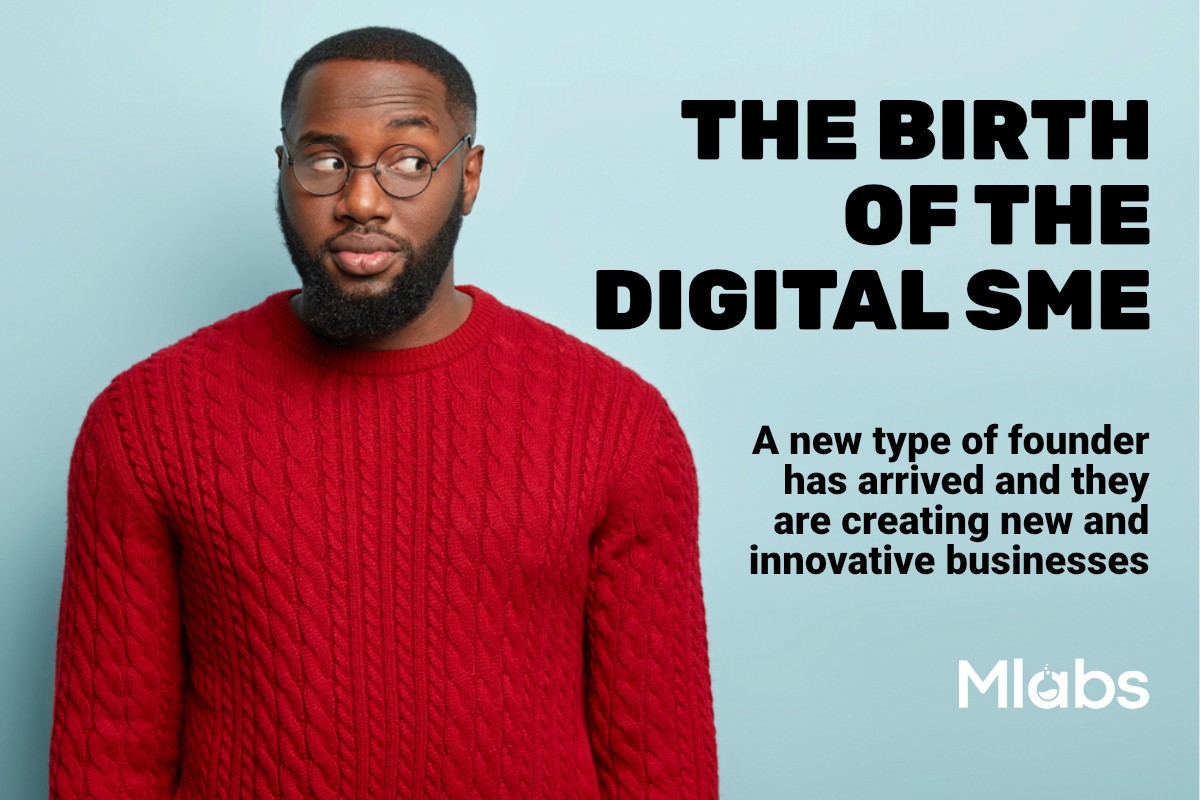
Simon Jenner
Friday 7 May 2021

A massive drop in the cost of entry for digital entrepreneurs has allowed for the creation of more niche and interesting business models.
Posted in:
Startups
For the first time in a decade the growth rate of small to medium sized entities has flatlined. It’s not hard to understand why, but hiding behind the cataclysmic impact of Covid-19 on retail, leisure and tourism is a more encouraging and interesting trend: The birth of the digital SME.
The Changing SME Landscape
The UK definition of SME is generally a small or medium-sized enterprise with fewer than 250 employees. The EU’s definition is similar: an SME is a business with fewer than 250 employees, a turnover of less than €50 million, or a balance sheet total of less than €43 million.
In the UK SMEs account for three fifths of the employment and around half of turnover in the private sector. They play an enormously important role in the economy.
The UK economy has been changing over the past fifty years. There has been a slow and steady decline in the primary sector (farming, mining) for some time and post war the secondary sector (manufacturing) began a sharp decline too. At the same time there was a boom in tertiary sector companies. The UK economy is now reliant on the success of its service businesses.
Defining the Digital SME
The digital transformation of businesses began back in the 80’s with the birth of the affordable home computer. It’s unlikely that you would find a single company in the UK that doesn’t use a computer for something they do. The internet has also been widely accepted by businesses since the 90’s (84% have a website). In fact, as an ambassador for tech I find it grating when people say “if only businesses would embrace technology!” Most have, or at least as much as they need to.
Defining a digital businesses is easiest if we focus on the channels they use to communicate with customers. Digital businesses are often only available via internet and application. They offer their customers a product or service that uses data, processing and connectivity to create a value proposition. Communication, Finance, Media and Professional services are all booming areas for digital business as, of course, is e-commerce.
Whats changing right now?
To engage in the idea of building a digital business used to be an expensive game. While the average startup launches with a budget of around $10,000, a digital startup has always required pre-seed and seed funding to deliver its technology. Getting started has always been the biggest challenge. The average pre-seed round comes in at $500k. Seed is nearer $2.2m. Raising funds typically requires the support of angels and venture capitalists. A small percentage of founders make it through the process.
Investors require any startup they support to be capable of scaling massively if they are to stand any chance of making the kind of return that ‘brings back the fund’. Therefore, the spectrum of business models and propositions that they are willing to support is limited. If a digital startup isn’t aiming for world dominance it’s not getting built.
The advent of no-code cut the cost of building and launching a digital startup down to around $10,000, a sum that is in line with the kind of funds required to launch any business. That means that founders can tackle a far broader range of products and services and, wonderfully, a far more diverse group of founders has access to the game of launching a digital business.
What does that mean for the future?
We are living through the birth of the digital SME. While no-code is eating part of the market previously dominated by coded applications its impact is really in opening up a far larger market of development that previously didn’t exist. While Gartner may have predicted that 65% of applications will be built with no-code / low code in 2025 what they didn’t state is that the market is likely to more than double in size.
Innovation does not come from letting the same people do things in the same way they always have. It comes from new technologies enabling new minds to enter markets they previously had no access to. One phrase that has been banded around to describe the emerging tribe of founders is “Citizen Developer”. It’s an awfully drab moniker. It makes the no-code community sound like the sort of people you’d hate to be stuck next to at a dinner party. It fails to capture the diverse voices that are now building startups.
Our founders look nothing like the founders of the 2010’s. They are old ship’s captains, ballerinas, body builders, people obsessed by miso soup, kids, old people, every shape, size, colour, sexuality, belief system and social background. They are all different and they will, I assure you, build very different things.
These are the founders of the new digital SME. Businesses that are built to feed families and to serve small communities. They are just like other SME, employing a few staff that care deeply about their mission. They are the businesses that will prop up the economy of the future and their journey is starting right now.
The Changing SME Landscape
The UK definition of SME is generally a small or medium-sized enterprise with fewer than 250 employees. The EU’s definition is similar: an SME is a business with fewer than 250 employees, a turnover of less than €50 million, or a balance sheet total of less than €43 million.
In the UK SMEs account for three fifths of the employment and around half of turnover in the private sector. They play an enormously important role in the economy.
The UK economy has been changing over the past fifty years. There has been a slow and steady decline in the primary sector (farming, mining) for some time and post war the secondary sector (manufacturing) began a sharp decline too. At the same time there was a boom in tertiary sector companies. The UK economy is now reliant on the success of its service businesses.
Defining the Digital SME
The digital transformation of businesses began back in the 80’s with the birth of the affordable home computer. It’s unlikely that you would find a single company in the UK that doesn’t use a computer for something they do. The internet has also been widely accepted by businesses since the 90’s (84% have a website). In fact, as an ambassador for tech I find it grating when people say “if only businesses would embrace technology!” Most have, or at least as much as they need to.
Defining a digital businesses is easiest if we focus on the channels they use to communicate with customers. Digital businesses are often only available via internet and application. They offer their customers a product or service that uses data, processing and connectivity to create a value proposition. Communication, Finance, Media and Professional services are all booming areas for digital business as, of course, is e-commerce.
Whats changing right now?
To engage in the idea of building a digital business used to be an expensive game. While the average startup launches with a budget of around $10,000, a digital startup has always required pre-seed and seed funding to deliver its technology. Getting started has always been the biggest challenge. The average pre-seed round comes in at $500k. Seed is nearer $2.2m. Raising funds typically requires the support of angels and venture capitalists. A small percentage of founders make it through the process.
Investors require any startup they support to be capable of scaling massively if they are to stand any chance of making the kind of return that ‘brings back the fund’. Therefore, the spectrum of business models and propositions that they are willing to support is limited. If a digital startup isn’t aiming for world dominance it’s not getting built.
The advent of no-code cut the cost of building and launching a digital startup down to around $10,000, a sum that is in line with the kind of funds required to launch any business. That means that founders can tackle a far broader range of products and services and, wonderfully, a far more diverse group of founders has access to the game of launching a digital business.
What does that mean for the future?
We are living through the birth of the digital SME. While no-code is eating part of the market previously dominated by coded applications its impact is really in opening up a far larger market of development that previously didn’t exist. While Gartner may have predicted that 65% of applications will be built with no-code / low code in 2025 what they didn’t state is that the market is likely to more than double in size.
Innovation does not come from letting the same people do things in the same way they always have. It comes from new technologies enabling new minds to enter markets they previously had no access to. One phrase that has been banded around to describe the emerging tribe of founders is “Citizen Developer”. It’s an awfully drab moniker. It makes the no-code community sound like the sort of people you’d hate to be stuck next to at a dinner party. It fails to capture the diverse voices that are now building startups.
Our founders look nothing like the founders of the 2010’s. They are old ship’s captains, ballerinas, body builders, people obsessed by miso soup, kids, old people, every shape, size, colour, sexuality, belief system and social background. They are all different and they will, I assure you, build very different things.
These are the founders of the new digital SME. Businesses that are built to feed families and to serve small communities. They are just like other SME, employing a few staff that care deeply about their mission. They are the businesses that will prop up the economy of the future and their journey is starting right now.
Ready to launch your startup idea with an MVP?
Download our step by step guide for non-technical founders to create a startup Minimum Viable Product (MVP)
Get the eBook

